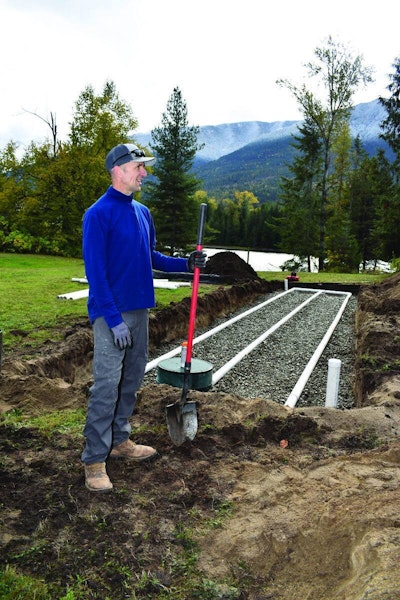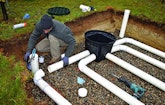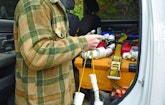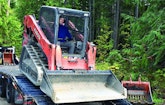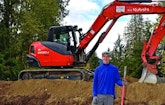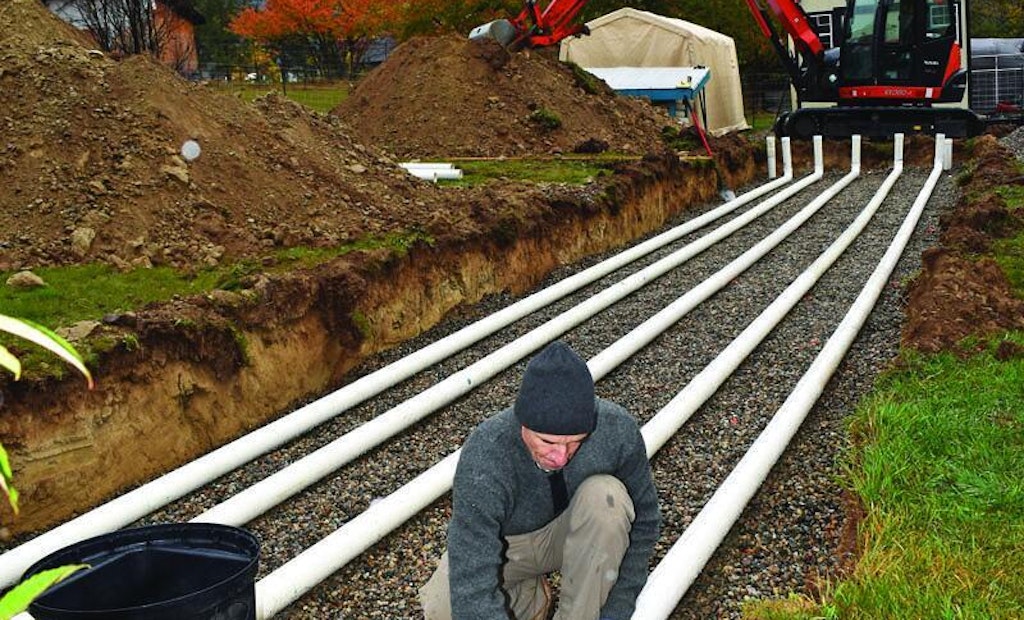
Joe Karthein lays out drainfield pipe bedded in rock over sand for excellent dispersal. (Photos by Jess Phillips)
Interested in Business?
Get Business articles, news and videos right in your inbox! Sign up now.
Business + Get AlertsEight years ago, Joe Karthein didn’t have the foggiest idea how a septic system worked. Now, he not only installs them, but he also designs them.
Karthein’s route to onsite system work was, as he says, convoluted. Several experiences led him to the industry, but since starting Sentinel Excavating in 2014, he has found success even through extremely difficult times.
“Back in my early 20s I went through a small business training program,” he says. “That was so pivotal in me starting my first company.” That company was an organic sauerkraut business, which Karthein owned and operated for seven years before selling in 2006.
Next up in his professional career was a few years as a small business counselor offering professional advice for anyone looking to start their own company or grow an existing business. With a good grasp on what it takes to be successful, Karthein decided to pursue a career doing something that would be fruitful, and that he would enjoy.
“I actually saw there were a lot of opportunities locally,” he says. “I knew there was work in excavation and loved the idea of working outside.” Karthein now runs Sentinel Excavating as a one-man show serving a roughly 50-mile radius from Nelson, British Columbia, doing installs and system designs.
A BOLD BEGINNING
Digging into the world of excavation was a relatively smooth process for Karthein, thanks to his willingness to ask questions and learn from people around him.
“I knew a guy named Phillip Jackson, who started out as a health inspector back when health inspectors around here designed septic systems. I called him up after not seeing him for about 20 years and ended up inviting him over for lunch,” Karthein says. “He explained to me how a septic system worked, and we took it from there.”
Jackson is now semi-retired, but it was his business, Fourways Environmental that helped get Karthein his first job. “He mentored me and was on the ground with me during my first few installs,” Karthein says. “He brought me a lot of work and helped me so much.”
Jackson’s support was only one part of the path to success. Karthein’s experience going through the small business training program shaped his outlook on business.
“The biggest thing I learned there was to not worry about the competition at all and just be the best that I can be,” Karthein says. “More than that, I learned to use the competition as allies, to learn from them and to ask questions.”
And that’s exactly what he did. Besides Jackson, Karthein called several other local excavators and installers and inquired about the trade. He even asked the difficult questions like how much they charge and if they thought there was room in the market for him.
“You’ve got to be bold. I think the most important thing to be successful in business is to ask the right questions to the right people,” Karthein says. “And most importantly, don’t ask questions that reconfirm what you think you know. Ask questions to try to prove yourself wrong.”
The strategy worked. “I got into this business, guns blazing, and the very first year I made a profit,” he says. Those allies as it would turn out, would come in handy down the road for Sentinel.
OVERCOMING HARDSHIPS
In late 2021, Karthein received news that would greatly impact his business and overall mindset.
“I found out I had colorectal cancer and all the scans said it was not looking good for me at all,” he says. “But, I had a pretty stoic outlook from the beginning. I actually felt pretty at peace and felt like I pushed the limits of a lifetime.”
Karthein underwent surgery within two months of the initial diagnosis and is now cancer free. “It was a long and strenuous recovery, but I’m doing awesome now and feel stronger than ever,” he says.
The recovery was tough on his body and business, putting him out of work for a while. “About two months after surgery I picked up a few jobs,” Karthein says. “I just made sure to tell my clients my situation and explained that I may be moving slower or have to leave on occasion, but that I will bill accordingly.”
His annual revenue in 2021 was about half of what it normally is, but the business survived. Karthein credits a few different things for his business enduring the hardship. “Preparing mentally is the biggest thing,” he says. This is something he continues to work on. “I exercise even more now so I feel great. I’m physically stronger, and since the health scare my mentality is more grateful toward everything.”
The other contributor was leaning on the relationships he formed with competitors when the going got tough. “One thing I taught clients during small business counseling is how important your contact list is,” he says.
He records all vital information about clients, but also a memory trigger to remind himself of the specifics on the customer and job. He does the same with competing installers. When a customer calls him in need of help and he can’t take the job, he goes back into his records and sends the clients information on to another installer or engineer that he thinks will best serve and fit their needs.
Regardless of the circumstances, suggesting trusted competitors is his way of business. “There’s more than enough work to go around and I can’t do everything,” he says.
INSTALLING IS JOB No. 1
Currently, septic system installs make up most of Karthein’s workload, but he is choosing to design more plans these days.
“I have done more plans than ever this year. I’ve done eight designs already this year, and about 10 installs,” Karthein says. “Installs certainly make up the majority of my work, and definitely the most of my revenue.”In years past, Sentinel’s revenue has been about 60% from septic installs and the rest in general excavation, but this year, installs have made up roughly 85-90% of the company’s revenue. The reason is simple: Karthein likes doing it. “I’ve got to the point where I can pick and choose jobs,” he says. “So, I end up doing what I want to do, which is often septics.”
Karthein now averages 18 installs per year, which is slightly less than in the past. A couple years ago, he had a right-hand man who worked with Sentinel for about 5 years. The worker took a job with the city of Nelson and Karthein decided not to replace him.
“It’s a very small-scale business, but it works for me,” he says.
BECOMING CHOOSY
With an abundance of work in the area, and Karthein being the solo performer for Sentinel, choosing projects he wants is just part of the job.
Geography is one of the biggest factors — the closer the work, the better. Besides that, he just tries to feel out clients and asks himself if they seem like people he wants to work with.
“Another thing that helps me decide is how I bill. I bill by the hour, and it works for me,” Karthein explains. “I have a one-page document I send clients that explains everything about my rate structure and how I work. It always ends up being a win-win. If a customer sees that and isn’t comfortable proceeding with me and my estimate, then I rule them out.”
With that strategy, Karthein says he doesn’t spend time making sure he doesn’t lose money on quotes. He also thinks it allows him to get more work done because his time isn’t spent on quotes that end up going to someone else. “My motto is that I need to make a living, not a killing,” he says. “I respect my clients and I want it to be a fair transaction.”
Also, he is very particular about engineers he chooses to work with, which also determines his involvement in specific jobs. “I love engineers that give me every detail I need to know, and I execute the plan,” Karthein says. “I don’t want an engineer that doesn’t tell me the orifice size or how many holes there need to be in a pressure distribution system.”
WEAR AND TEAR
Sentinel serves an area with mountainous terrain. “It’s a skier’s and mountain biker’s paradise,” Karthein says. “It’s relatively warm, but we have steep mountains and tons of snow.”
Located right in the middle of large mountains, Karthein finds himself constantly towing equipment up inclines that present challenges, one of which is getting trailers where they need to go. The key is not using something too large.
“In Canada, the big goosenecks with the right weight ratings are all like 36 to 45 feet long, and I can’t use that up here,” he says. Karthein’s trailer is currently 30 feet, and he says there are times he even wishes he had a 26- or 28-foot unit due to the tight locations he constantly finds himself in.
He also acknowledges that wear and tear on a tow vehicle can be detrimental to your business if you don’t have the right equipment and pay attention to vehicle gauges. Karthein says he watches the gauges in his Ram 3500 like a hawk to make sure he is not abusing his truck and says selecting the heaviest-duty options when buying are crucial.
“I use four-wheel drive low on solid pavement just to get up some hills around here,” Karthein says. “You might go through four-wheel drive components a little faster, but doing that takes so much strain off your transmission and everything else.”
Winter installs in the Nelson area aren’t very practical and because of that, Sentinel operates about nine months of the year. “Basically, from mid-December to mid-March I’m sitting on the sidelines, but if the weather and roads permit, I’ll take a few winter jobs,” he says.
The mountains also create extremely variable soil conditions. “There is everything. Just when I think I have an area figured out, I’ll find something that surprises me,” Karthein says. “There’s no question, soil analysis is the hardest part of the job and one of the reasons I turn more complex projects over to an engineer. Two heads are better than one, especially when we are looking out for each other.”
DIGGING HIS EQUIPMENT
Karthein utilizes a 2021 Kubota KX 080-4 excavator. A few add-ons like a skeleton bucket for rocks have proven extremely beneficial. “They are pretty useful when it’s really rocky. When digging out a field, you can screen bigger rocks out so you have nice fill for putting on top of the drainfield,” he says.
Along with the excavator, he has a 2016 Kubota SVL75 skid-steer that doesn’t see a lot of hours, but for the hours it’s used, it’s crucial to his business. A 750-pound Wacker Neuson diesel compactor is also in his arsenal. That too, does not get a lot of use, but when it’s needed, it’s a must-have.
Karthein recently purchased a Diamond C LPD 210 dump trailer and he’s not sure how he lived without it. “It’s got two 10,000-pound axles with single wheels on it and is just awesome for scooping drain rock right out of the box, which is amazing for keeping job sites tidy because I no longer have to dump messy drain rock loads on people’s manicured lawns,” he says.
To pull the equipment, he recently purchased a 2022 Ram 3500 truck with a customized flat deck built by Mofab in Rossland, British Columbia. “I have built-in boxes below the deck both in front and behind the wheels as well, plus a long removable box on the driver’s side for shovels, rakes, chainsaw, whatever,” Karthein says.
With the flat deck and compartment modifications, Karthein opens options on what he can haul. “I can load all sizes of 8-foot-wide Premier Plastics septic tanks width-wise on top of the compartments,” Karthein says. “I like Premier Plastics for their smaller tanks, and I use Canwest tanks for their large, low-profile tanks.”
Along with Premier and Canwest, Karthein says his go-to systems for dispersal are Eljen systems or seepage beds or sand mounds. “I’m a big fan of seepage beds and trenches with drain rock if the soils allow it,” he says. “Drain rock based systems are so proven, they just last and work.”
MAKE A DIFFERENCE
Karthein has gone through a lot and come a long way in the past eight years. Though a small operation, Sentinel Excavating makes a big impact and Karthein wants it known that owning and operating a septic installation business on your own is not only possible, but rewarding.
“You can do quite well as a one-man show,” Karthein says. “You can create a great customer experience and there’s no standing around ever, which is a bonus to me.”
